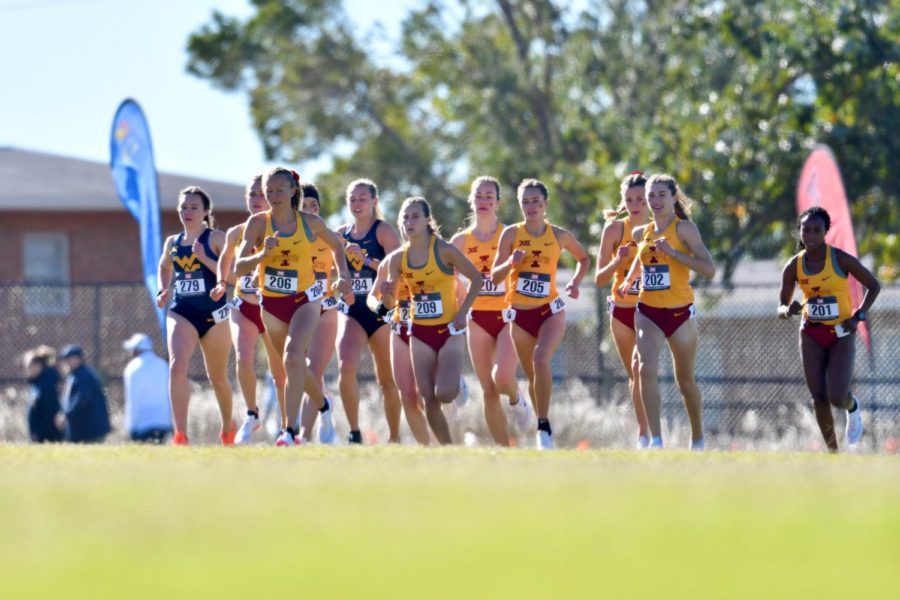Title IX: Cross country and the power of perseverance
Iowa State women’s cross country team competes in the Big 12 Cross Country Championship on Oct. 29 in Stillwater, Oklahoma.
July 19, 2022
In 1972, landmark legislation allowed women to receive equal support in educational endeavors, especially athletics.
In women’s cross country, the Cyclones led the charge into the new era of collegiate athletics.
In fact, the Iowa State Cyclones were the premier program in the nation after Title IX changed the course of the sport. Fifty years later, despite a tragic event in the program’s history, Iowa State remains one of the nation’s leaders.
Early Years
Despite getting its start nearly fifty years after its male counterpart, Iowa State women’s cross country was a winner right out of the gates.
Not only did Iowa State earn a first-place finish in the first five Big Eight conference seasons, but the Cyclones also finished first nationally in the first four seasons following Title IX’s impact.
Title IX guaranteed women across the country the promise of equal participation and support from universities. However, women like Iowa State’s Peg Neppel-Darrah were taking things a step further by taking the lead of the nation’s trailblazing female athletes.
Neppel-Darrah became Iowa State’s first-ever female national champion in 1975 when she finished first in the AIAW championship. With George Veenker Golf Course in Ames playing host, Neppel-Darrah’s teammate Barbara Brown was close behind in eighth place.
Running at its home course, led by Neppel-Darrah and Brown, Iowa State secured the first national title in the sport of women’s cross country.
At the 1975 meet, Penn State, Michigan State, Oregon, Florida and other highly established athletic programs rounded out the field. As women continued to make strides in the world of college athletics because of the impact of Title IX, the Cyclones continued to soar.
The Cyclones gained another national title the next season. At the 1976 championship meet held in Madison, Wisconsin, three Iowa State cross-country athletes found themselves in the top-ten placings in their events.
Again, in 1977 and 1978, the Cyclones were on top of the AIAW in the sport of cross-country. Deb Vetter earned two top-ten individual finishes in those two seasons and helped give Iowa State the first four championships of the new era of women’s college athletics in cross country.
The era of success was ushered in by the landmark legislation passed just over fifty years ago.
The Seven
Twelve years after Title IX’s impact began and 10 years after the program’s initial championship, tragedy rocked the Iowa State program.
While traveling home to Ames after completing a competition, seven members of the program died when the team’s twin-engine airplane crashed near Des Moines.
The team was traveling home from the NCAA championships in Milwaukee, Wisconsin, and faced ice and fog as they flew. The team performed impressively, earning individual top times and placing second in the competition only behind top-ranked Wisconsin.
However, weather conditions caused planes to land at the Des Moines airstrip instead of the Ames airport.
The team, the university and the cross country community lost three runners, two coaches, a student manager, and the plane’s pilot. The cross country team and the Ames community came out stronger after the tragedy and fought to overcome the major loss they had on that day.
Today, a memorial exists at the location of the incident. The $10,000 memorial, unveiled in 2018, was funded by the community.
Continued success
Iowa State women’s cross country has remained a powerful program as the impact of Title IX continues to uplift women’s sports across the country.
The Cyclones enjoyed several individual championships and remained a Big 12 conference leader. The Iowa State women finished first in the Big 12 Championships as recently as 2020.
Iowa State returned to the nation’s top spot in 2012 when Betsy Saina won the NCAA individual championship.
It’s clear that Iowa State cross country is as strong now as ever, as it regularly finishes among the top teams in the Big 12, making yearly appearances in the NCAA Championship. This success is in part thanks to the opportunities created by Title IX.







